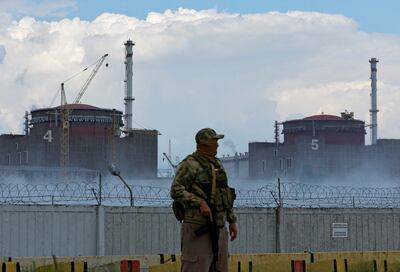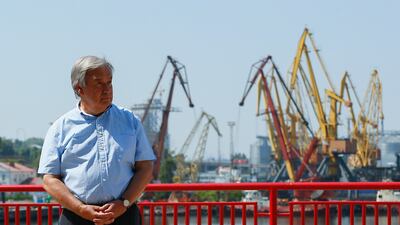The head of the UN urged Russia on Friday not to cut off the Zaporizhzhia nuclear plant from Ukraine's power grid, as alarm bells ring over a potential disaster at the site.
Visiting southern Ukraine, UN Secretary General Antonio Guterres said the power produced at Zaporizhzhia "is Ukrainian electricity... this principle must be fully respected".
It came after Ukraine's nuclear operators expressed concern that Russia is planning to disconnect Zaporizhzhia - occupied by Russian troops early in the war, although still administered by Ukrainian staff - and siphon off the power for occupied Crimea.
Ukraine was on high alert on Friday for a potential nuclear catastrophe at the Zaporizhzhia plant, after raising the alarm because Russian operatives were mysteriously told to stay at home.
A Ukrainian military intelligence unit said Russian representatives were absent from an evening meeting on Thursday and appeared to have left the plant altogether, heightening suspicion that a false-flag provocation is being planned.
It said it had received reports that all but a small number of operational personnel had been told to stay away from Zaporizhzhia, which is occupied by Russian forces, on Friday.
“Considering the number of weapons that are currently located on the territory of the nuclear plant … there is a high probability of a large-scale terrorist attack at the nuclear facility,” the intelligence unit said.
Mykhailo Fedorov, a deputy prime minister of Ukraine, claimed turbines in the Zaporizhzhia plant had been laid with Russian mines.
State nuclear operator Energoatom said the potential threat "could be ten times greater than the scale of the Fukushima and Chernobyl disasters".
Kyiv accuses Russia of shelling the plant and using it as a shield by firing from the area in the knowledge that Ukrainian forces will be reluctant to shoot back.
Moscow rejects these accusations and says Ukraine is firing at the plant.
Russia prepared on Thursday to blame Ukraine for any incident at Zaporizhzhia by claiming a Ukrainian artillery brigade was poised to fire on the plant.
“The blame for the consequences will be laid on the Russian armed forces,” pro-Kremlin news agency Interfax quoted the Russian Defence Ministry as saying.

The two sides also accuse each other of obstructing a mission by the UN's International Atomic Energy Agency to check on safety conditions at Zaporizhzhia.
Ukrainian President Volodymyr Zelenskyy said Russia should immediately withdraw troops from the area and clear the way for International Atomic Energy Agency (IAEA) representatives to come in.
“If it does not ensure this, we can simply throw the entire body of international documents on nuclear and radiation safety into the trash,” he said.
UN Secretary General Antonio Guterres, who held talks with Mr Zelenskyy and Turkish President Recep Tayyip Erdogan in Ukraine on Thursday, echoed the call for the area to be demilitarised.
Zaporizhzhia is the largest nuclear power plant in Europe, with six reactors. The scare there comes after Russian troops caused much unease by occupying the Chernobyl exclusion zone early in the conflict.
Mr Erdogan expressed fear that the situation could deteriorate into a “new Chernobyl”, while Mr Guterres said that “any potential damage to Zaporizhzhia is suicide”.
“Common sense must prevail to avoid any actions that might endanger the physical integrity, safety or security of the nuclear plant,” Mr Guterres said.
Ukraine crisis — in pictures
Russia in turn said it had no heavy weapons at the plant but only “security units” and claimed that Nato-manufactured shells had been found near the site.
The plant is near one of the front lines of recent fighting as Russia prepares for a Ukrainian counter-attack in the south.
To the east, Mr Zelenskyy said more than 10 people had died in missile attacks on Kharkiv.
A regular British intelligence update said on Friday that little territory had been gained around Kharkiv since May but that the city had suffered some of the most consistent shelling since the invasion began.
Kharkiv has suffered because it is within range of most types of Russian artillery, and multiple rocket launchers and “generally inaccurate area weapons” have caused devastation in the city, it said.













